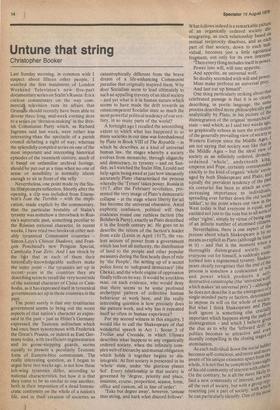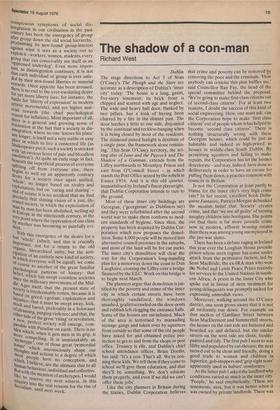Untune that string
Christopher Booker
Last Sunday morning, in common with I suspect about fifteen other people, I watched the first instalment of London Weekend Television's new five-part documentary series on Stalin's Russia. It is a curious commentary on the way commercial television runs its affairs that Granaa should recently have been able to devote three long, mid-week evening slots to a series on 'decision-making' in the British Communist Party which, as Richard Ingrams said last week, were rather less interesting than the spectacle of a parish council debating a right of way; whereas the splendidly compiled series on one of the most important and interesting historical episodes of the twentieth century, much of it based on unfamiliar archival footage, should be put out at a time when no one of sense or sensibility is normally idiotic enough to sit in front of the telly. Nevertheless, one point made by the Stalin film prompts reflection. Shortly after the opening, a clip was included from Eisenstem's Ivan the Terrible — with the implication, made explicit by the commentary, that the particular brutality of Stalin's tyranny was somehow a throwback to Russia's autocratic past, something peculiar to the Russian national character. In recent weeks, I have tried two books on other notably tyrannical Communist countries — Simon .Leys's Chinese Shadows, and Francois Ponchaud's new Penguin Special, Cambodia Year Zero. And I am struck by the fatt that in each of them their historally-knowledgeable authors make the same point — the tyrannies set up in recent years in the countries they are describing seem to recall the very worst side of the national character of China or Cambodia, as it has expressed itself in tyrannical governments set up in those countries in the past. The point surely is that any totalitarian government seems to bring out the worst aspects of that nation's character as expressed in the past — just as Hitler's Germany expressed the Teutonic militarism which had once been synonymous with Frederick the Great's Prussia, or indeed as East Germany today, with its efficient regimentation and its goose-stepping guards, seems equally to present a peculiarly Teutonic form of Eastern-bloc communism. The really interesting question, as I began to argue here two weeks ago, is not how these left-wing tyrannies differ, according to national characteristics, but how it is that they come to be so similar to one another, both in their imposition of a dead bureaucratic conformity on the whole of a nation's life, and in their creation of societies so catastrophically different from the brave dream of a life-enhancing Communist paradise that originally inspired them. Why does Socialism seem to lead ultimately to such an appalling travesty of an ideal society — and yet what is it in human nature which seems to have made the drift towards an omnicompetent Socialist state so much the most powerful political tendency of our century, in so many parts of the world? A fortnight ago I recalled the astonishing extent to which what has happened to so many societies in our time was foreshadowed by Plato in Book VIII of The Republic — in which he describes, as a kind of universal human law, the stages whereby a society evolves from monarchy, through oligarchy and democracy, to tyranny — and on Sunday, as I watched the Stalin film, I could not help again being awed at just how uncannily accurately Plato characterised the process whereby the 'Tyrant' takes power. Russia in 1917, after the February revolution, presented the very image of Plato's democratic collapse — at the stage where liberty for all has become the universal obsession. Amid euphoric confusion, political will then coalesces round one ruthless faction (the Bolshevik Party), exactly as Plato described it in the fourth century BC. He goes on to describe the return of the faction's leader from exile (Lenin in April 1917), the violent seizure of power from a government which has lost all authority, the distribution of land to the people and other popular measures during the first heady days of rule by 'the People', the setting up of a secret police force to 'safeguard democracy' (the Cheka), and the whole engine of oppression finally rolls on its way. It would be a reckless man, on such evidence, who would deny that there seems to be some profound archetypal pattern of collective human behaviour at work here, and the really interesting question is how precisely does the pattern work, and why has it repeated itself so often in human experience? For my second witness in this enquiry, I would like to call the Shakespeare of that wonderful speech in Act 1, Scene 3 of Troilus and Cressida, in which Ulysses describes what happens to any organically ordered society, when the infinitely complex web of hierarchy and mutual obligation which holds it together begins to disintegrate. At first society is presented in its 'whole' state, under 'the glorious planet Sol'. Every relationship in that society is governed by 'degree, priority and place, insisture, course, proportion, season, form, office and custom, all in line of order'. 'Take but degree away', however, 'untune that string, and hark what discord follows'. Spectator 19 August 1978 What follows indeed is a remarkable picture of an organically ordered society disintegrating, as each relationship based on mutual reciprocity dissolves, and as each part of that society, down to each inrii' vidual, becomes just a little egotistical fragment, out only for its own interests: 'Then every thing includes itself in power, Power into will, will into appetite, And appetite, an universal wolf,
So doubly seconded with will and power' Must make perforce an universal prey, And last eat up himself'.
One thing particularly striking about that celebrated passage is that it is so clearlY describing, in poetic language, the same process described more philosophically and analytically by Plato, in his picture of the disintegration of the original 'monarchical' state — and which, as I said two weeks ago, so graphically echoes in turn the evolution of the generally prevailing view of society in Western Europe since the Middle Ages. I am not saying that society was like that in ,the Middle Ages — but the ideal view of society as an infinitely ordered, divinelyordained 'whole', underneath king,' emperor and Pope, certainly corresponde" exactly to the kind of organic 'whole' envisaged by both Shakespeare and Plato; and equally the prevalent tendency of the past six centuries has been to attach an ever' increasing importance to individuals, spreading ever further down the old 'social ladder', to the point where our view in the, West today is that everyone is equal, Oa, entitled not just to the vote but to all sorts or other 'rights', simply by virtue of being one of an infinite number of atomised citizens. Nevertheless, there is one aspect of the process about which Shakespeare is by no means as explicit as Plato (although he hints at it) — and that is the moment when a thoroughly disintegrated society, with everyone out for himself, is suddenly fro's' formed into a regimented tyranny. Shakes' peare clearly recognises that the end of the ... process is somehow a coalescence a will power which produces a soli', destructive catastrophe (the 'universal wolf which makes 'an universal prey') —althouri: he does not describe it as the emergence ° A single-minded party or faction, determine" to impose its will on the whole of societ..y,. But what I think Shakespeare and both ignore is something else cruciolf important which happens along the path. v.. disintegration — and which I believe give,' the clue as to why the 'leftward drift' in politics becomes so attractive and eveo of morally compelling in the closing stages atom isation. As each individual down the social lad becomes self-conscious, and more and more aware of his unique existence apart from the whole, it is not that he completely loses 567., of his old community of interest with othertso On the contrary, he is all the more likelY„h find a new communityof interest not p reP WiL.. all the rest of society, but with a g resenting just a part of society, with wrou. n:;:st he can particularly identify. One of the al
,
conspicuous symptoms of social disintegration in our civilisation in the past century has been the emergency of group after group down the old social hierarchy, Proclaiming its new-found group-interest against what it sees as a society out to exploit it—workers, women, students, every group that can conceivably see itself as an Oppressed underdog'. Even more important, as disintegration continues, it is not that each individual or group is ever satisfied by their new-found liberties or material rewards. Once appetite has been aroused, there is no end to the ever-escalating desire for Yet more liberty (see, for instance, the battle for 'liberty of expression' in modern artistic movements), and yet higher material rewards (the chief psychological reason for inflation). Most important of all, frustration is a general and growing sense of tr. ustration at the fact that a society in disintegration where no one 'knows his place, any longer, is itself not a very stable or easy Place in which to live a contented life (as Shakespeare put it, such a society is stricken With 'an envious fever of pale and bloodless emulation'). At quite an early stage in fact, beneath the superficial process of everyone splitting off from everyone else, there begins to well up an apparently contrary desire for a society once again unified, Whole', no longer based on rivalry and exploitation, but on 'caring and sharing' — and of course it is no accident that we find Precisely that shining vision of a just, liberated society, in which the exploitation of !Ilan by man has been abolished, welling up In Europe in the nineteenth century, at the very Point where the oppression of one class by another was becoming so painfully evident.
, With this emergence of the desire for a !ost 'whole' (albeit, and this is crucially unPortant, not for a return to the old °.rganic, hierarchical unity, but the antiFipation of an entirely new kind of society, In which everyone will be equal), we come of course to another of the great familiar PsY.chological patterns of history: that pellet which has swept countless societies since the millenary movements of the Middle . Ages itself, that the present state of Society is irredeemably rotten, because it is • a.secl. on greed, egotism, exploitation and injustice; that it must be swept away, lock, stock and barrel, preferably in a holocaust of cleansing, purging violence; and that, the oather side of the great 'rising' or revolution, new perfect society will emerge' comarable with Paradise on earth. There is no idea which, when it gets men in its grip, is ,More compelling. It is unmistakably an farchetype,, one of those great 'primordial
.nns' which unconsciously shape our ifylights and actions to a degree of which Which I have no conception, and w, Inch, I believe, are the ultimate clue to all
..",ninari behaviour, individual and collective. t!nt with the mention of archetypes, I would like t.0 reserve my next witness, in this
enquiry into the real reasons for the rise of Socialism untilrise of until next week.



































 Previous page
Previous page